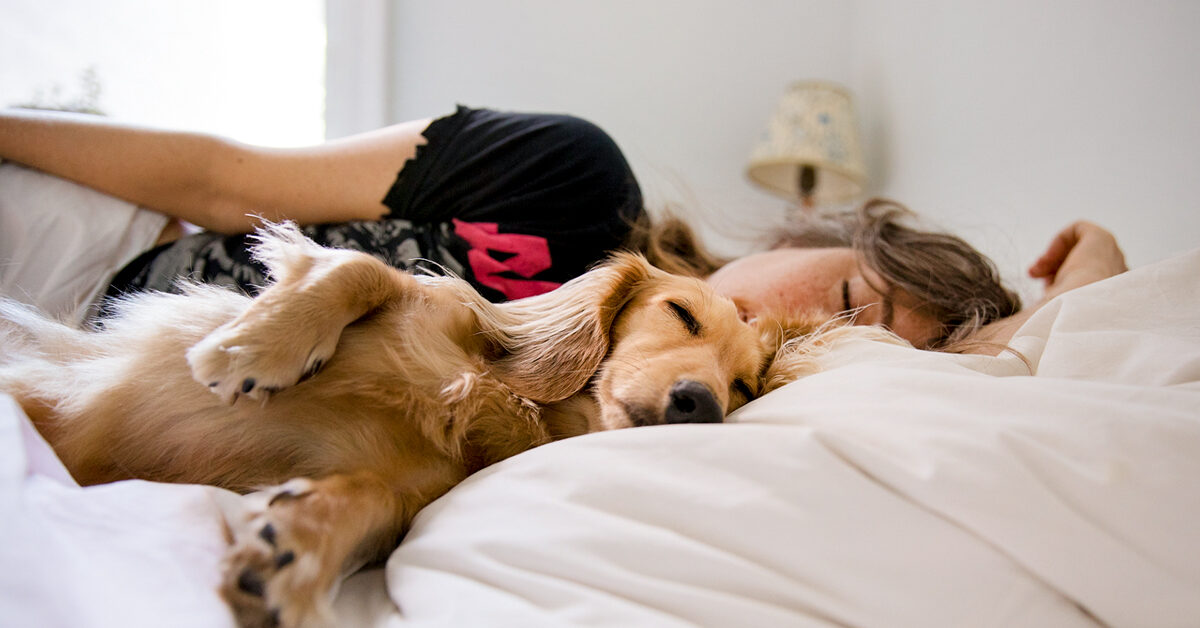- July 29, 2022
- No Comment
- 13 minutes read
Sleeping with Dogs: Benefits for Your Health, Risks, and Precautions – Greatist

People love sleeping with their dogs, and it’s safe to say the feeling is mutual.
Often considered part of the family, the chemistry between dogs and people is undeniable. That’s why 56 percent of dog owners report sleeping next to their dogs.
Cuddling up with your four-legged pal feels good, but it’s not without problems, including sleep interruptions.
Let’s explore the advantages and disadvantages of sleeping with your dog, plus tips for getting a peaceful night’s sleep together.
Pets benefit their people in many ways. Whether sleeping with your dog or cat enhances those benefits is up for debate and may depend on your personal circumstances.
Having a dog in bed can affect your sleep. Of course, there are other contributing factors, such as the number of people and pets, pet size, and bed size. It all has to sync up.
A small study of adults found that people sleep just fine with a dog in the bedroom but less so when the dog is actually in the bed. A good solution may be to keep a dog bed beside your own.
Other research found that when compared with cats and other people, dogs in bed were perceived to be less disruptive to sleep.
If you wake up refreshed and aren’t fatigued during the day, your dog is probably a good sleeping buddy.
A 2018 survey of adult women showed that a dog in bed is associated with comfort and security more so than sleeping with another person or a cat. It’s a feel-good thing, particularly if you’re lonely or separated from your dog most of the day.
Pets help relieve stress and anxiety. They foster social and emotional connections, which can affect mood and overall mental health.
A 2012 study showed that human-animal interactions may benefit stress-related factors, such as:
There’s limited evidence showing they may help:
A 2016 study suggests that for people with long-term mental health problems, pets should be considered a main source of support.
Sleeping next to your furry friend may help reinforce those benefits.
While dogs can make good sleep companions, there are other factors to consider.
Dogs are always on the alert, so they’re light sleepers.
One 2020 study shows that having a dog in bed increases human movement. This can potentially disturb sleep, but those people rarely remember waking up due to dog movement. This research was conducted on a very small sample of women and may not apply to a wider population.
A dog that snores, slobbers, or overheats the bed is probably not an ideal sleep mate. You may wake up still tired or longing for a daytime nap.
Cats are nocturnal, so they can be challenging nighttime sleep partners. They may want to play or even purposely wake you up.
Pets can carry allergens like dust and pollen into your bed. This can aggravate severe allergies and asthma.
Bacteria, parasites, and fungi can all spread from dogs and cats to humans. Germs can spread through:
In the United States, the risk of disease from sleeping with your pet is low, with most risk coming from:
A dominant or aggressive dog in the bedroom is a significant risk for dog bites, especially for children.
There’s no evidence to support the theory that allowing your dog in bed will make them feel dominant.
Some dogs growl or bark when you approach the bed because they may view their sleeping spot as territory to be guarded. Consistent training can break this habit.
Kids and pets make wonderful companions, but children are more susceptible to germs than adults, particularly if the pet tends to lick.
Aggressive dogs may be especially dangerous to children, and it’s more difficult for a child to get quality sleep with a pet in the bed.
Pets shouldn’t sleep with an infant. If you’re not sure your little one is old enough to have a pet in bed, talk to your child’s doctor.
If you share a bed with someone else, it’s important that they agree with the sleeping arrangements. Here are more tips for achieving nighttime harmony:
When things hit a snag and a good night’s sleep can’t be had, have your dog sleep elsewhere until you work things out. Get advice from a veterinarian or professional dog trainer.
Even if you enjoy having your pet in bed, it’s not always a good idea. In some cases, you’ll need to put a temporary hold on bed sharing. In other cases, it’s best avoided altogether. If you have serious health issues, ask your doctor if it’s safe for your pet to sleep in your bed.
Consider sleeping without them if your pet:
Or if you have:
Many people look forward to snuggling up with beloved animal companions. Pets have been known to affect sleep. But for many people, the emotional benefits balance any negatives. It all comes down to personal choice.
When weighing pros and cons, consider your health, your dog’s health, and quality of sleep. Take up problems or concerns with a doctor or a veterinarian.
If your dog is well-behaved and you wake up feeling refreshed, then roll over and let them hop in.
This article was originally published on Healthline.com. To view the original, click here.
Last medically reviewed on July 15, 2022
9 sourcescollapsed
OUR BRANDS

